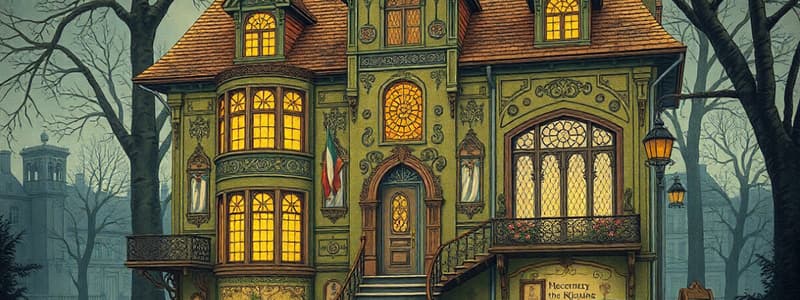Podcast
Questions and Answers
What is the primary subject of the document?
What is the primary subject of the document?
- An interaction between two individuals. (correct)
- A detailed account of Max's life.
- A discussion of a musical instrument.
- A comprehensive analysis of Inspector Fontaine's career.
If the conversation between Max and Inspector Fontaine is later used as evidence in a trial, what type of evidence would it likely be considered?
If the conversation between Max and Inspector Fontaine is later used as evidence in a trial, what type of evidence would it likely be considered?
- Forensic evidence
- Physical evidence
- Circumstantial evidence
- Testimonial evidence (correct)
What could be inferred if the document frequently mentions specific times and dates related to Max's actions?
What could be inferred if the document frequently mentions specific times and dates related to Max's actions?
- The information is irrelevant to the discussion.
- The conversation is casual and informal.
- Max is meticulous and organized. (correct)
- Inspector Fontaine is disinterested in the details.
What is the nature of the document?
What is the nature of the document?
If a subsequent document reveals that Max and Inspector Fontaine had met several times prior, how might this influence the interpretation of their conversation?
If a subsequent document reveals that Max and Inspector Fontaine had met several times prior, how might this influence the interpretation of their conversation?
Flashcards
Conversation
Conversation
A dialogue between two or more people.
Max
Max
One of the people involved in the conversation.
Inspector Fontaine
Inspector Fontaine
The other person in the conversation, likely with authority.
Dialogue
Dialogue
Signup and view all the flashcards
Interaction
Interaction
Signup and view all the flashcards
Study Notes
Max's House in Washington D.C.
- Max's grandfather, Henri Fontaine, previously owned the house.
- Max's friend, Georges De Smet, lived next door.
- Max's friend, Hugo LeClerq, lived behind the house.
- The current owners rent the house to foreigners.
- The house was considered Max's house despite the other family living there.
Inspector Fontaine
- Considered the house to be his.
- Found the garden overgrown.
- Suggested a garden trim.
- Impresses Max the current owner (Fontaine) of the home.
Madame Pauline
- Translated Inspector Fontaine's comments.
- Suggested Max join the Boy Scouts, but Max wasn't enthusiastic.
Max's Interactions
- Received a card from Inspector Fontaine with his contact information.
- Max was concerned about potential meddling, and Inspector Fontaine's true intentions.
- Inspector Fontaine mentioned Tintin and the Smurfs as examples of Belgian culture.
- Max found the police's interest in Max's house somewhat suspicious.
Studying That Suits You
Use AI to generate personalized quizzes and flashcards to suit your learning preferences.




